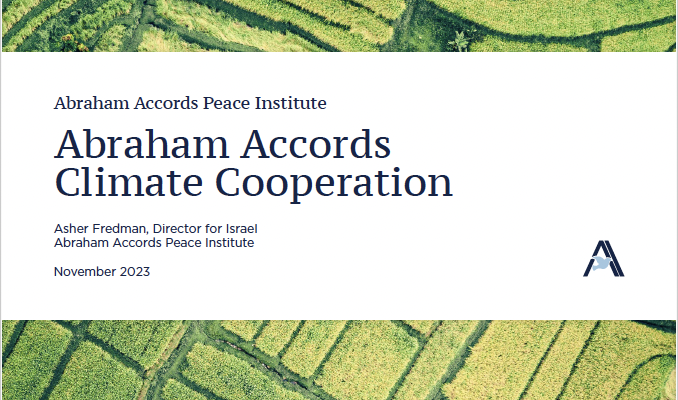Analysis
Abraham Accords Climate Cooperation
December 12, 2023

Israeli President Herzog’s meeting with Emirati President Mohamed bin Zayed came on the sidelines of the 2023 UN Climate Conference, COP28, which is being hosted this year by the UAE. The UAE’s leadership in organizing and hosting COP28 marks a major milestone in the country’s growing global role on the issue of combating climate change, which is at the top of the international agenda.
As the world comes together to discuss strategies for climate action, we have chosen to highlight in this month’s newsletter the numerous ways in which Abraham Accords climate cooperation is contributing to a sustainable future. This cooperation is already having a tangible impact on lives across the countries of the Abraham Accords and the broader region.
From November 30 to December 12, 2023, the world will come together in Dubai for the UN Climate Conference, COP28, hosted by the UAE. Key priorities for COP28 include accelerating emissions reductions, building the energy systems of the future while decarbonizing the energy systems of today, transforming food systems, reforming land use, and putting nature, people, lives and livelihoods at the heart of climate action.
The Abraham Accords, since their signing in 2020, have opened the door to ground-breaking cooperation in the fields of climate-tech, environmental preservation and scientific collaboration. This cooperation has the potential to shape a more sustainable future for the Middle East, while helping deliver on mitigation and adaptation goals around the world.
The following are examples of Abraham Accords cooperation in the fields of climate action and sustainability:
United Arab Emirates - Israel:
- Israeli company Watergen and Emirati company Al Dahra signed a strategic agreement on water security, which aims to bring Watergen’s water-from-air technology to the UAE and other countries in the region. In addition, Watergen, together with Emirati company Baynunah and Tel Aviv University, announced a three-way partnership to develop a joint Israeli-Emirati water research institute. The partnership aims to capitalize on opportunities to improve drinking water qualities, optimize sources of drinking water, improve water supply for advanced irrigation, streamline food production output and implement advanced technologies for treating water and wastewater.
- DisruptAD, the venture capital arm of the Abu Dhabi sovereign fund ADQ, co-led a 105-million- dollar investment in Aleph Farms, an Israeli lab-grown cultivated meat start-up. The investment will help bolster Abu Dhabi’s long-term focus on food security and resilience.
Morocco - Israel:
- Israeli company H2Pro and Moroccan renewable energy developer Gaia Energy signed an agreement at the 2022 UN Climate Conference (COP27) for co- development of a gigawatt-scale green hydrogen project.
- Four Israeli food tech startups, led by Halman-Aldubi Technologies, announced a project together with the Marrakesh-based Mohammed VI Polytechnic University (UM6P) to develop sustainable food solutions without the need for water, land or energy. As part of the project, the university, in cooperation with the Israeli startups, will produce high-protein fish food from municipal organic waste, insects and algae.
Bahrain - Israel:
- Mekorot, Israel’s national water company, signed an agreement to develop and upgrade the water economy of the Kingdom of Bahrain. Under the agreement, signed with the Bahrain Electricity and Water Authority, Mekorot will provide consulting, planning, and support services in a number of fields, including seawater and brackish water desalination, as well as water resources management and its supply to the population of Bahrain.
- Israeli climate-tech start-up BladeRanger and Alpha Solar, one of Bahrain’s leading energy providers, formed a partnership to assist solar site owners in the Gulf region to maximize power generation by utilizing BladeRanger’s autonomous solar-panel cleaning robots.
In light of the far-reaching challenges to our climate and natural environment, particularly in the Middle East, cross-border climate cooperation is more important than ever. The past three years have demonstrated the tremendous potential benefit of collaboration between Abraham Accords countries on sustainability and climate innovation. Expanding and deepening these partnerships can help improve the lives and livelihoods of peoples across the Middle East, while promoting regional stability, prosperity and peace.